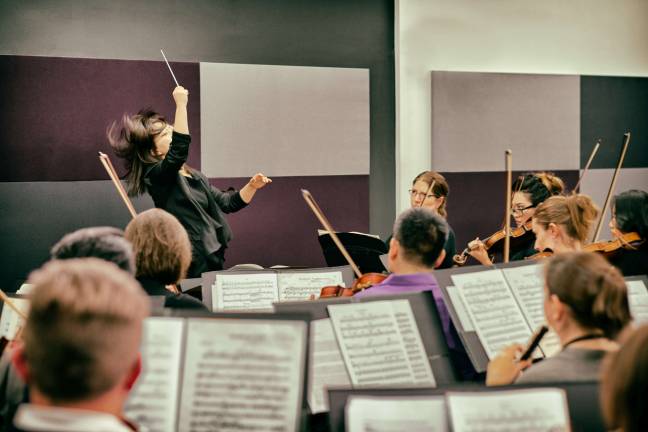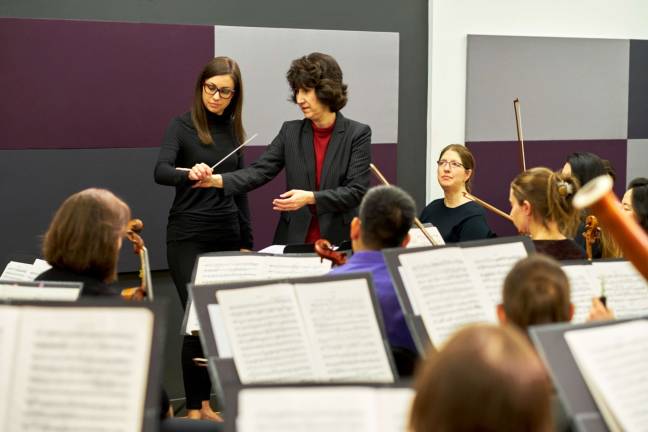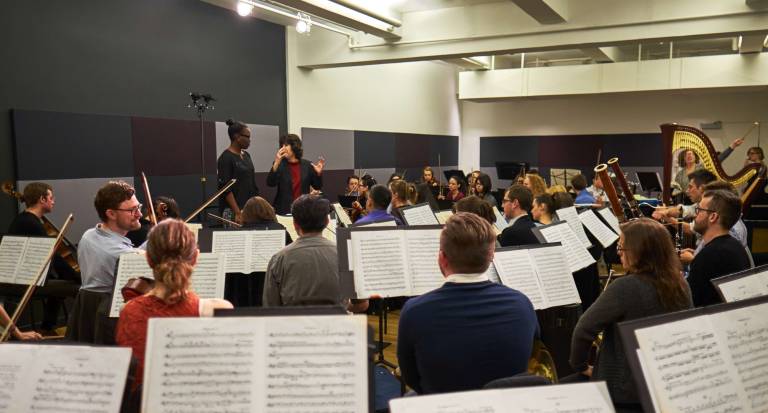RAising the baton



Jennifer Drake is no stranger to the conducting podium. As the music director of Serenata Orchestra, a community orchestra based in Boise, Idaho, she picks up the baton from time to time. “Conducting is maybe about 10 percent of what I do,” said the violist. “But it's becoming an increasingly important component of my life.”
After a March trip to New York City, conducting is destined to play a bigger role for her. She was one of 12 conductor fellows who attended last month's inaugural International Women's Conducting Workshop hosted by the New York Conducting Institute in Chelsea.
Conducting is a traditionally male-dominated occupation — in 2016, just 9 percent of music directors in the United States were women, according to the League of American Orchestras. Drake is the only female conductor of a community orchestra in the state of Idaho.
“What's disappointing is ... we've seen a growing number of women playing in the orchestra, but we haven't seen the same growth on the podium.” said Diane Wittry, principal conductor of the Allentown Symphony Orchestra and the workshop's instructor.
She likened the enduring dearth of women conductors to a parallel situation in the business world. “We've seen some growth of women executives in business, but not as much growth as we would've hoped or expected for,” she said.
The workshop, held at the National Opera Center on Seventh Avenue, focused on techniques and movements. The subtleties often omitted in a unisex conducting class were included here. “Women tend to cave their shoulder a little bit more as a natural body stance than men, who tend to stand with their shoulders back more — this affects conducting,” Wittry said. “In this workshop, we were able to talk about some of those things.”
Drake praised the workshop's organizers for focusing on more than score and instrumental education. “It helps people learn how to move and get the ideas out from their head into their hand, so it can be communicated to the orchestra,” Drake said of the “baton basics” portion of the workshop.
“Conductors have to be able to know everything that's in the score on the printed page,” she said. “But we also have to know the people in the orchestra and the instruments that they are playing, we need to be able to inspire them to create the music that's written on the page, and bring it to life.”
Drake recalled that she was “skeptical” about attending a women-specific workshop. “Oftentimes in competitive professional situations, women can be catty and cut each other down,” she said. “But this has been an incredible supportive group of women.”
The workshop featured two full orchestra sessions and five sextet sessions. Each conducting fellow had 13 minutes of “podium time” during each of the seven sessions. The sextet and the orchestra — comprised of professional musicians who are mostly freelancers in New York City — played Stravinsky's “Firebird Suite” (the 1919 version) and Tchaikovsky's Symphony No. 5 under the direction of the conducting fellows.
Susan Metcalf, the orchestra's concertmaster, said the workshop was a memorable experience. “I had to forget everything I learned” in order to not only follow the fellows — some are in their early 20's and were there to learn from mistakes — but also to support them, she said. “I really wanted them to know that I was on their side, that they were safe in front of us.”
The workshop also included a series of career seminars and panel discussions featuring established female conductors Victoria Bond, Teresa Cheung, Janna Hymes and Gisele Ben-Dor. The discussions covered topics such as succeeding in a male-dominated field.
“Conducting is a very lonely job, male or female,” Wittry said. “There are very few conductors in each city, especially in a smaller city.”
The workshop brought 19-year-old Lucy Becker, a music education student at University of Kentucky, to New York City for the first time. She was one of eight auditor fellows who didn't conduct on the podium, but were invited to attend all of the classes and panel discussions.
“We talked about lots of questions you can't Google,” she said. “To talk with women that are in this life, living the life that I want to have as a conductor, as a musician — that's the best you can get.”